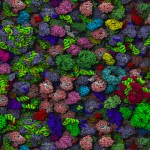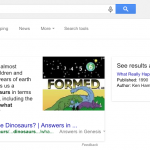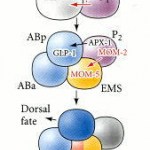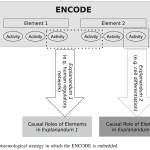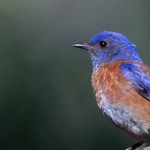evolution
I've been a blood donor for over twenty years. The other day a doctor called me and asked me if instead of my normal quarterly donation, I'd be willing to give a few extra hours of my time along with a chunk of white blood cells. I said yes.
There's this transplant patient at a hospital in Stockholm. Like all such patients this person, let's call her Joan (I have no idea what her real name is), is on immune suppressant drugs to keep her body from tossing out the transplanted organ. She now seems to have contracted a difficult infection. Unfortunately she's developed antibodies against run-of-…
I'm a bit shell-shocked today -- man, that was a long drive yesterday -- and I stumbled into work today thinking this might be a really good day to bag it early and take a nap. And then I found something in my mailbox that perked me right up.
As a little background, I'll summarize my talk in St Louis. I pointed out that there was more to evolution than natural selection. Natural selection answers the question of adaptedness -- how do organisms get so good at what they do -- but there's another important question, about diversity and variation -- why do organisms do so many things in so many…
I've only just noticed that I have a fondness for food metaphors when talking about development -- gastrulation is a peculiar way to make a jelly sandwich, neurulation is like rolling up a burrito, and somite formation is a meatball sub. They sort of illustrate the arrangement of the tissues involved, but of course they all have shortcomings…but then explaining how the metaphor doesn't work can be just as informative as the metaphor itself.
For instance, early in its development, the vertebrate embryo consists of two epithelial sheets, the epiblast and hypoblast, pressed against each other…
Turtles are nifty animals, with a remarkable adaptation: they've taken their ribs and shifted them outside their appendicular skeleton, flattened and expanded them, and turned them into a shell. It's a clever twist, and it doesn't require any magic -- just a shift in timing during development, with a little extra signaling. The molecular biology and development explain mechanistically how it happened, and we also have fossils of some of the in-between states.
Odontochelys, a 220 million year old fossil, for instance, is a good example of a turtle ancestor that's got some of the bits but not…
A groundbreaking study published in PLOS ONE offers hope that scientists can reverse the development of antibiotic resistance among bacteria with the help of "a mathematical model that pinpoints optimal antibiotic cycling patterns." On The Pump Handle, Kim Krisberg writes, "the research comes at a time of widespread concern that without a coordinated, well-funded response to growing antibiotic resistance, medicine could lose some of its most effective, life-saving tools." The collaboration between biologists and mathematicians yielded a piece of software dubbed "Time Machine" that "computes…
Did you ever wonder? And if you did wonder, did you Google it? And if you did google it, did you get the results shown above? And if you did, did you click "feedback" and do something like the following?
No? Do so now, please.
This is important. Why? Because we have been hearing rumors lately that Google intends to change the way it produces searches to bias the search results in the direction of more reliable sites. But the number one search result for a key question that a lot of people ask about evolution is a bogus creationist site.
I've never, for one moment, gone along with the idea…
Yesterday was a long day, starting in the operating room and finishing at a dinner reception for our visiting speaker today. As a result, when I arrived home, I was sawing the proverbial logs within five or ten minutes of hitting the couch, more or less without realizing it. I was going to just skip today, making it a rare weekday where I don't provide you, my loyal readers, with a dose of the Insolence, be it Respectful or not-so-Respectful, to which you have become accustomed. But then I saw an article that reminded me of a topic that I haven't revisited for quite a long time. I'm referring…
In my previous post about Paul Nelson's weirdly ignorant view of nematode evolution, Kevin Anthoney made a prescient comment:
Remember that Nelson’s got this bizarre linear view of evolution which starts with a single cell creature, which evolves into a creature with a few cells, which evolves into one with a few more cells, and so on until you reach the 1031 cells in the nematode today. It wouldn’t surprise me at all if Nelson thought that the creature at the 150 cell stage in this process had to be like a modern nematode at the 150 cell stage of development.
The Discovery Institute has…
The latest fatuous obsession by Paul Nelson, Philosopher of Biology at the Discovery Institute, is a real corker. He has decided that nematodes could not possibly have evolved, because scientists (real ones, not creationist pseudoscientists) have produced an extremely detailed literature documenting their development; because Brenner, Horvitz, and Sulston (no creationists among them) won the Nobel Prize for their work describing the cell lineages to produce the worm; and because he doesn't understand developmental biology at all. I've got palm impressions in my forehead from smacking myself…
This is one of the loveliest fossils I've ever seen. They are the bones of a Neanderthal, found in a cave in southern Italy, and although they've been calcified by mineral-rich water trickling through the cave where they were found, it's an almost complete skeleton, with the bones all intact.
That's the grisly part of the story. This person apparently fell into a hole in the karst landscape and was trapped -- he's presumed to have starved to death there. There were no predators able to reach him, either, so his body decayed in place, his bones slumped into a pile, and the slowly accumulating…
Dan Graur has snarled at the authors of a paper defending ENCODE. How could I then resist? I read the offending paper, and I have to say something that will weaken my own reputation as a snarling attack dog myself: it does make a few good points. But it's mostly using some valid criticisms to defend an indefensible position.
Here's the abstract.
In its last round of publications in September 2012, the Encyclopedia Of DNA Elements (ENCODE) assigned a biochemical function to most of the human genome, which was taken up by the media as meaning the end of ‘Junk DNA’. This provoked a heated…
This is one of those great examples of research you can probably use in an advanced biology classroom (high school) or intro college bio pretty effectively. It includes birds. It includes hormones. It includes evolution. What else is there, really?
I did a very brief writeup on it here, and you can get the original paper which is very straight forward and readable.
The bottom line: Females in one species of bird manage to figure out that under certain, occasional conditions if they produce really obnoxious and overbearing sons, those sons will do well. So they do. There is a phylogenetic…
Anomalocaris has always been one of my favorite Cambrian animals -- it was so weird, and it was also the top predator of the age, making it the equivalent of T. rex. The anomalocarids were also a diverse and successful group, so wouldn't you know it…it also had a distant filter-feeding cousin in the Ordovician. This is Aegirocassis benmoulae.
Isn't that beautifully bizarre? The great appendages on the front of the animal have been modified to form a filter-feeding apparatus. It was also a real monster, over 2 meters long.
You want to know more? One of the discoverers, Peter van Roy, has…
I've now read two novel attempts to explain the existence of junk DNA. To a lot of people, the very idea of junk DNA is offensive: whatever process built us, whether divine fiat or the razor-sharp honing of natural selection, must be powerful, omnipotent or nearly so, and incapable of tolerating any noise or sloppiness, especially not to the degree seen in the eukaryotic genome. There is no room for error in design.
There's also a strong whiff of human exceptionalism. Look at us, we're pretty much perfect! Or at least, movie stars and super-models are the pinnacle of creation/evolution. How…
Hint for science journalists: if the hook to get readers to pay attention to your story is to warn them to sit down because a 19th century "law" of evolution has been shown to be wrong, you're going to irritate scientists, who will then write rude blog posts sneering at your writing. That's the case with this story titled The Wrists of Birds Reveal Evolution Undoing Itself, which is also subtitled Contrary to earlier claims, a new study shows that evolution may be reversible.
It's describing a paper on the re-emergence of a wrist bone in birds, and it touts Dollo's Law.
The 19th-century…
A paper was recently brought to my attention via a Creationist. It was the usual 'HAHAHA! Oh you silly Creationist! This paper says the opposite of what you think it says!', and I was going to write a blog post along that usual theme.
Fazale Rana, 'Vice President' of 'Research and Apologetics' at Reasons to Believe said on Facebook:
What happens when the best evidence for biological evolution becomes evidence for intelligent deign?
Retroviruses, long thought to be junk DNA, play a role in regulating gene expression in the brain (link to ScienceDaily about the article)
The article has some…
The The Crafoord Prize in Biosciences has been announced. For those who don't know, this is a very prestigious award, comparable to the Nobel prize, only not as well known. The categories are specifically designed to complement the Nobel.
This year's winners are Richard Lewontin and Tomoko Ohta, and it's about time.
Lewontin has been hugely influential.
However, until the 1960s, the view of genetic variation was entirely different: biologists believed that most individuals in a population were fairly similar, genetically speaking. This must, they assumed, be the result of natural selection,…
I finally got around to finishing Greta Christina's Comforting Thoughts About Death That Have Nothing to Do with God. It's good! This book is the sort of thing atheism needs more of: an acknowledgment that the phenomena most important to human beings can be addressed effectively without imagining fantastic supernatural creatures. Atheists have this reputation of being nerds all wrapped up in abstract concepts and making arguments against the superstitious props that people claim to find useful in day-to-day life, and it's good that some of us make the effort to show that no, we do deal with…
Michael Land was one of those people who totally warped my brain. I've been interested in science since I was a kid, but I'm embarrassed to say that I never heard a whisper about evolution in the public schools I attended. Although I read about it avidly, I came out of high school and charged off to college eager to learn about neuroscience. And I did!
But then I got led astray at the University of Washington by Johnny Palka. I worked in his lab looking at the innervation of fly wings, but the emphasis was on development -- big brains were too hard, so we were studying brains during their…
Dan Graur has written a good summary of genetic load. It's an important concept in population genetics, and everyone should be familiar with it…and this is a nice 2½ page summary with only a little math in it.
I'll try to summarize the summary in two paragraphs and even less math … but you should read the whole thing.
Genetic load is the cost of natural selection. You all understand natural selection (my usual problem is trying to explain that there's more to evolution than just selection), and so you know that you can't have selection without imposing a loss of fitness on individuals that…




